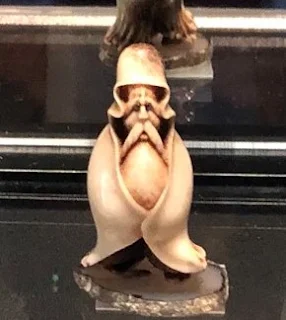 |
| A signature board of stamps of seven lucky Japanese gods |
This is a signature board (daigofu) with the name of seven lucky gods (shichifukujin) stamped in red and with these names and also the name of each temple where the seven gods are enshrined written in calligraphy on it.
These seven temples are all in Kyoto and I visited there to collect their stamps and calligraphy while on a "seven lucky gods pilgrimage." The characteristics of these gods (actually one is a goddess!) are outlined below.
God/goddess
|
Home country
|
Temple
|
Description
|
| 1. Benzaiten 弁財天 (only goddess) |
India
|
Benzaiten (弁才天 or 弁財天) has her origin in Hinduism. She is the only goddess, representing financial fortune, talent, beauty and music, and the patron of artists, writers, dancers, and geisha. | |
| 2. Daikokuten 大黒天 |
India
|
Daikokuten (大黒天) is the god of commerce and prosperity and the patron of cooks, farmers, bankers, and the protector of crops. He is also considered a demon hunter. | |
| 3. Ebisu ゑびす |
Japan
|
Ebisu (恵比寿), the only god who originates in Japan, is the god of prosperity and wealth in business, and of plenitude and abundance in crops, cereals and food. | |
| 4. Bishamonten 毘沙門天 |
India
|
Bishamonten (毘沙門天) whose origin is traced back to Hinduism, is the god of fortune in war and battles and the protector of those who follow the rules and behave appropriately. | |
| 5. Hotei 布袋 |
China
|
Hotei (布袋) is the god of fortune, the guardian of children, and the patron of diviners and barmen. He is also the god of popularity and often depicted as a fat, smiling, bald man with a curly mustache. | |
| 6. Jurojin 寿老神 |
China
|
Jurojin (寿老人) is the god of the elderly and longevity in Japanese Buddhist mythology, based on a real person who lived in ancient times and was about six feet tall with a very long head and a long white beard. | |
| 7. Fukurokuju 福禄寿 |
China
|
Fukurokuju (福禄寿) has his origin in China. He is the god of wisdom, luck, longevity, wealth and happiness and characterized by the size of his head almost as large as the size of his whole body. |
Japan's gods are so diverse, aren't they!! The seven deities consist of not only Japanese but also Chinese and Indian gods/goddess! Speaking of diversity, Japanese people are also diverse, so Taro Aso, Japan’s deputy prime minister and finance minister, who described Japan as the only one in the world with a single race, was wrong. He should study Japanese history! (For details, read this Washington Post article.)
Japanese people's diversity has been supported by the following authorities, too:
- National Museum of Nature and Science in Tokyo says that DNA shows that Japanese have been mixed with Korean and other peoples. For more, read "Is Japan Heading Toward Authoritarian State?"
- Asuka Historical Museum in Nara prefecture has the imperial family tree showing that their ancestors are Korean. For more, read "Is the Emperor a Human or God?"
- The previous emperor also said in 2001 that the imperial family had its roots in Korea (Press Conference on the occasion of His Majesty's Birthday (2001)). For more, read "Is Japan Heading Toward Authoritarian State?"
- Asuka Historical Museum in Nara prefecture has the imperial family tree showing that their ancestors are Korean. For more, read "Is the Emperor a Human or God?"
- The previous emperor also said in 2001 that the imperial family had its roots in Korea (Press Conference on the occasion of His Majesty's Birthday (2001)). For more, read "Is Japan Heading Toward Authoritarian State?"
If you want to meet the kawaii finger-sized Jedi Fukurokuju in the photo below, go to Tokyo National Museum!
日本の神って多様!そして日本人も多様なんですよ、麻生大臣!
東京国立科学博物館も、日本人が単一民族ではない旨をDNAの観点から、また、飛鳥資料館や上皇も、日本が単一民族ではないと言ってます。青木理氏もニュース番組で言っておられましたが、これ、「誤解を生じたら謝ります」という種類の問題ではありません。明らかな「事実誤認」です。麻生大臣、もう少し我が国の歴史を勉強していただけませんでしょうか。
 |
| Netsuke sculpture "Fukurokuju" |
京都七福神巡りで集めた御朱印の大護符です。私が巡った7つのお寺は以下の通り。
名前
|
寺社
|
出身
|
性別
|
ゑびす神
|
日本
|
男
|
|
大黒天
|
インド
|
男
|
|
毘沙門天
|
インド
|
男
|
|
弁財天
|
インド
|
女
|
|
布袋尊
|
中国
|
男
|
|
寿老神
|
中国
|
男
|
|
福禄寿神
|
中国
|
男
|
日本の神って多様!そして日本人も多様なんですよ、麻生大臣!
東京国立科学博物館も、日本人が単一民族ではない旨をDNAの観点から、また、飛鳥資料館や上皇も、日本が単一民族ではないと言ってます。青木理氏もニュース番組で言っておられましたが、これ、「誤解を生じたら謝ります」という種類の問題ではありません。明らかな「事実誤認」です。麻生大臣、もう少し我が国の歴史を勉強していただけませんでしょうか。
DNA分析と上皇発言については「Is Japan Heading Toward Authoritarian State? 日本人は権威がお好き」も、飛鳥資料館については「Is the Emperor a Human or God? 天皇だって人間だもの」も是非お読みください。
ちなみに、親指大の福禄寿ジェダイをご覧になりたい方は、東京国立博物館の根付コーナーにどうぞ!
ちなみに、親指大の福禄寿ジェダイをご覧になりたい方は、東京国立博物館の根付コーナーにどうぞ!



0 件のコメント:
コメントを投稿